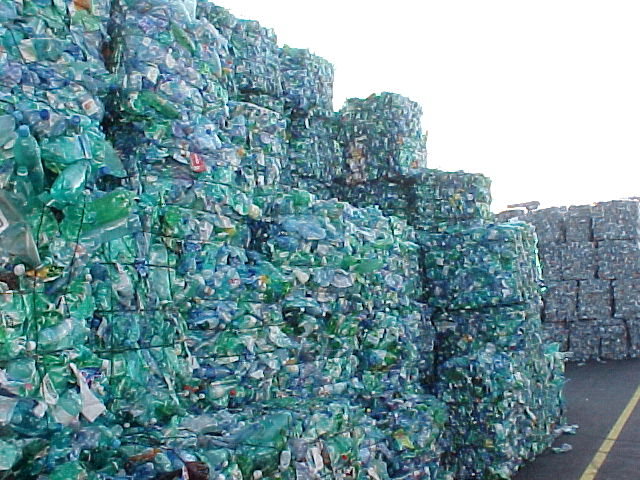WHERE DOES AMHERST’S TRASH GO?

Bales of crushed PET bottles at a recycling facility. Photo: wikipedia commons.
by Maura Keene
An article appeared in The New York Times last month indicating that due to the collapse of overseas markets, mostly in China, much of our country’s recycling is now burned or diverted into landfills. This prompted a national discussion about the state of recycling.
Amherst residents subsequently expressed interest in what happens to our recycling. Mimi Kaplan, Waste Reduction Enforcement Coordinator for the town, gave an informative report to the April 1 Town Council Meeting, suggesting that most of Amherst’s recycled materials are not going into landfills or incinerators but are still being sold to domestic and international markets.
Most residential homes in Amherst are served by either Amherst Trucking (2,440 households) or USA Trucking (1,280 households), which bought Duseau Trucking and Alternative Recycling in 2018. Both services charge about $400 per year for curbside pickup of trash and recycling. In addition, about 1,700 households pay $85 annually for a permit that entitles them to bring their recycling (free) and trash to the transfer station ($3 per bag). Apartment complexes use Republic Services.
Amherst Trucking, which requires the separation of cans and cardboard (“dual stream”), takes its recyclables to the Materials Recycling Facility (MRF, aka the “murph”) in Springfield. USA, which allows customers to combine containers and papers (“single stream”), takes most of its recyclables to its facility in Connecticut. Single-stream recycling tends to produce more contaminated materials than dual stream, and more single-stream materials end up as waste, rather than being recycled. USA claims that consumers prefer single stream because it is easier for them and hence yields a higher rate of participation. USA also offers compost pick-up for $11 for a large container. Several municipalities throughout Connecticut, including Fairfield and Westchester Counties and the City of New Haven have adopted curbside composting and across the county, municipal compost programs are diverting tons of organic materials from landfills and turning them into useful compost and mulch.
USA’s Connecticut transfer station sells its paper and cardboard to Sonoco at commodity prices, which have declined quite a bit recently. Some of Sonoco’s material might be sent overseas. Most of Amherst’s recycling is sold to domestic markets.
Councilor Dorothy Pam suggested that the town could reduce the carbon footprint of large trash trucks if each company were to handle a distinct part of town, so that multiple trucks are not covering the same area.
Meanwhile, the grant under which Ms. Kaplan was hired will be ending soon, so her efforts in educating residents about recycling and reporting on the results will not be continuing.
